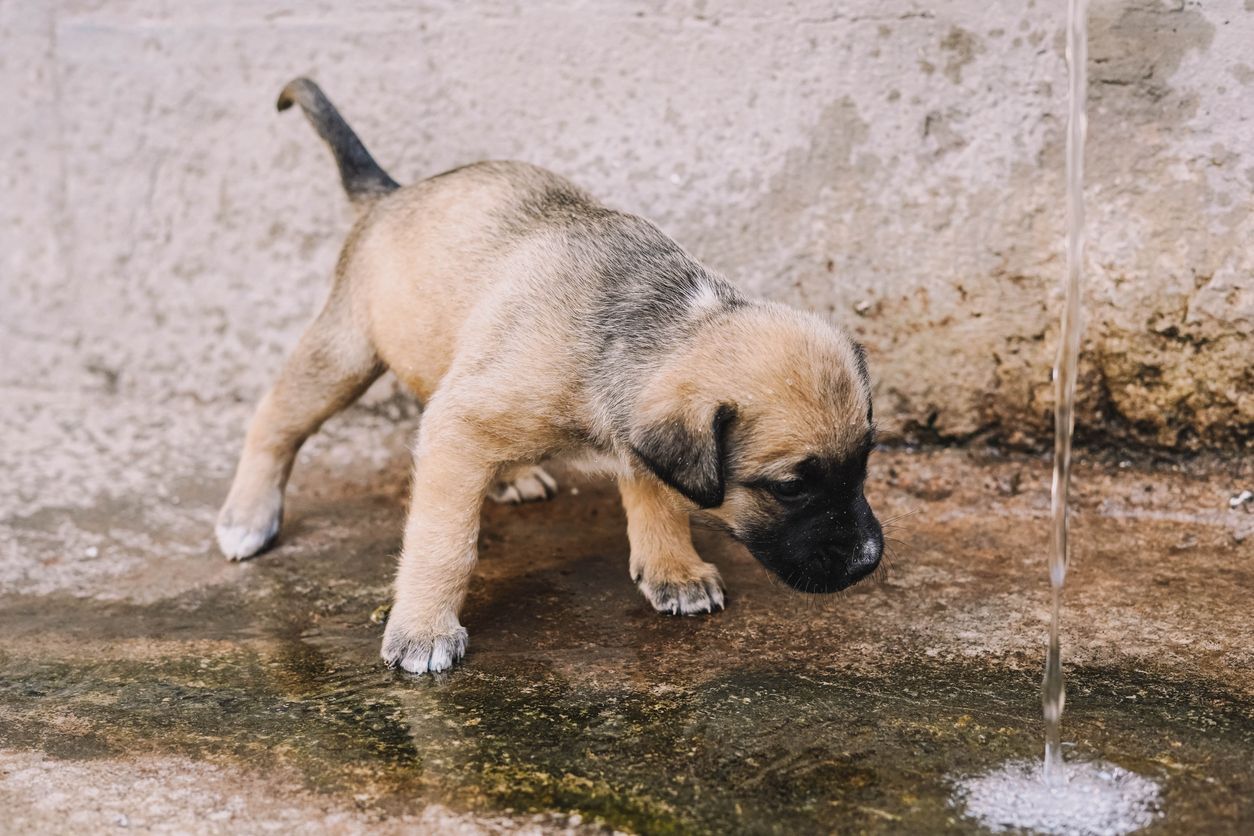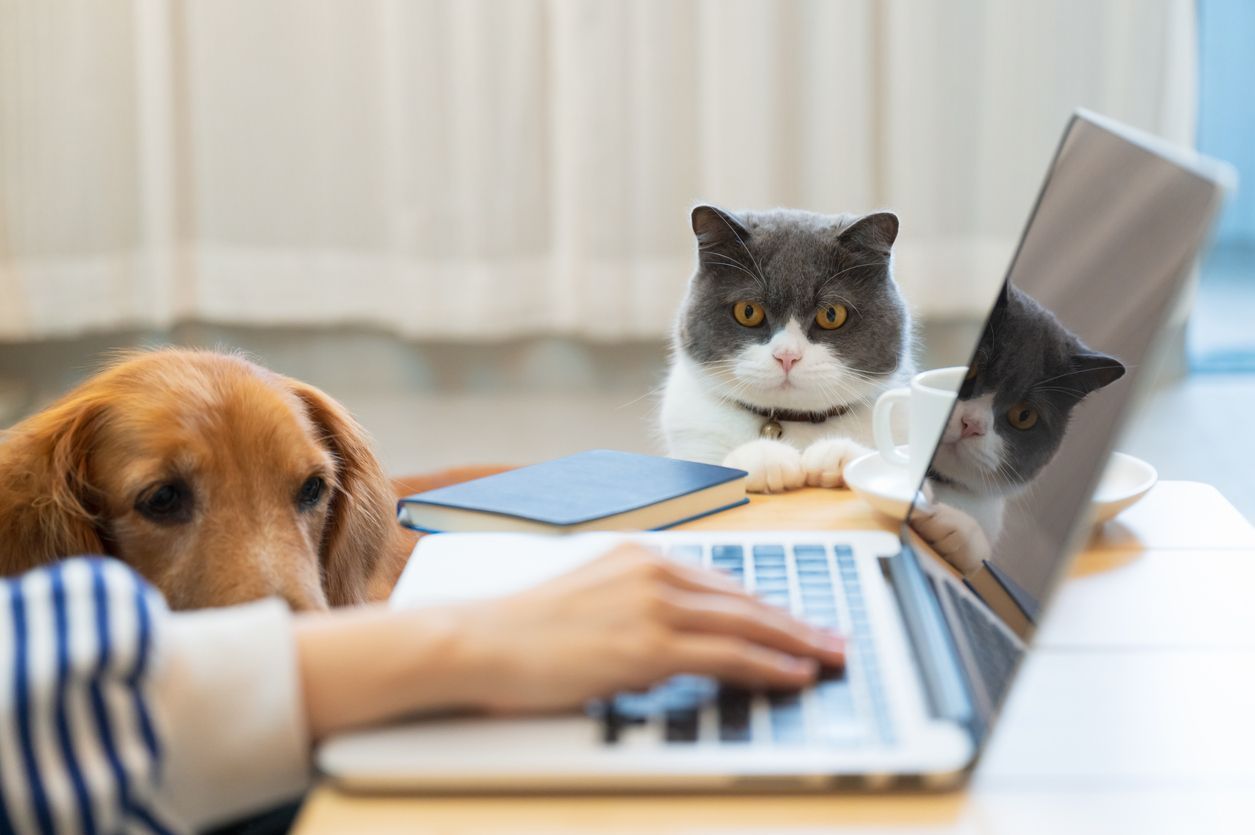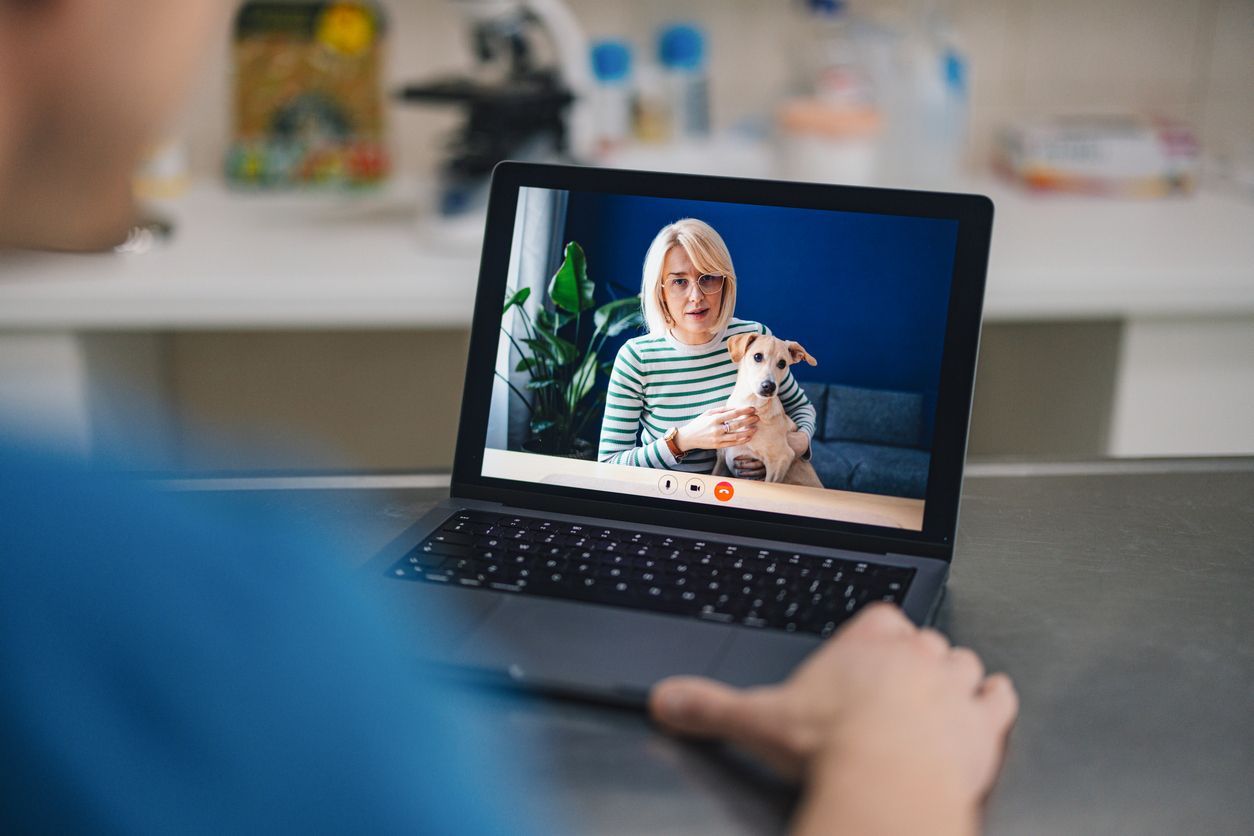Does my puppy have urinary incontinence?

Urinary incontinence in adult dogs is a common symptom with many underlying causes, but it is rare in puppies. When urinary incontinence does occur in puppies, it is usually due to a urinary tract infection or a congenital abnormality called ectopic ureters. If you have a puppy that is urinating around the house, read on to learn:
- The difference between urinary incontinence and house soiling
- Signs of urinary incontinence in puppies
- Common causes of a puppy leaking urine
- How inappropriate urination is diagnosed and treated in puppies
What is urinary incontinence?
Urinary incontinence (UI) describes involuntary leakage of urine. An affected dog urinates without control or awareness. This may appear as dribbling of urine while walking or wetting the bed while sleeping. It is not urine leakage when a dog actively squats or lifts their leg to urinate. UI is most common in senior dogs but can occur in puppies.
Urinary incontinence vs. inappropriate urination
Inappropriate urination is different from urinary incontinence. Dogs with UI are not aware they are leaking urine, whereas inappropriate urination describes a dog actively urinating in the home or another location they are not supposed to. Inappropriate urination is a form of inappropriate elimination, also called house soiling, which is common in puppies when they are not fully house-trained. Inappropriate urination may also occur due to behavioral causes such as fear, excitement, anxiety, marking territory, or submissive urination. It’s important to remember that young puppies are still developing strength in their bladder muscles and have limited ability to retain urine. It can take months to fully house-train a puppy while they are learning and developing bladder control.
Inappropriate urination may also occur due to a different medical issue that causes excessive, urgent, or frequent need to urinate. However, most illnesses that cause inappropriate urination or an overactive bladder are far more common in adult dogs and rare in puppies.
Signs of urinary incontinence in puppies
It can be difficult to know if a puppy is house soiling or has true UI. Signs of urinary incontinence in puppies can include:
- Damp, matted fur around the groin and belly
- Leaking urine while resting, walking, or playing
- Persistently wet bedding
Small dribbles or drops of urine may also be found around the home, but it’s difficult to distinguish this from inappropriate urination if you don’t see what the puppy is doing when it happens.
Most puppies with urinary incontinence can urinate normally, intentionally emptying their bladder when it is full. They also involuntarily leak at other times, producing small dribbles or spots of urine rather than a single, larger puddle of urine. Puppies with UI may be consistently damp and smell like urine from leaking urine on themselves. Urine pooling on the genitals and skin from UI may result in skin irritation, skin infections, or urinary tract infections.
Why is my puppy urinating around the house?
Incomplete or ineffective house-training is the most common reason for a puppy to have accidents in the home. Puppies may also urinate inappropriately for behavioral reasons. True UI in puppies is rare and is most commonly caused by anatomic abnormalities or a urinary tract infection.
Congenital defects
Birth defects or anatomical abnormalities in puppies can lead to UI. Ectopic ureter is the most common congenital defect in puppies that can cause UI. In a normal urinary tract, small tubes called ureters connect the kidneys that make urine to the bladder that stores urine. Urine travels through the ureters between these two organs. “Ectopic” means “in the wrong place.” An ectopic ureter most commonly attaches to the urethra, bypassing the bladder. The affected puppy is therefore incapable of holding that urine in the bladder, and it leaks out. A puppy may have one or both ureters displaced. Puppies with ectopic ureters often do not get diagnosed right away since they are not housebroken yet, and the accidents may be associated with house-training. These puppies may be considered “difficult” to potty-train rather than suspected of having a medical condition. Ectopic ureters affect female dogs more often than males, and it usually takes longer to diagnose males.
Urinary tract infections
The most common symptom of a urinary tract infection (UTI) is frequent urination while only passing small amounts of urine at a time. UTIs can sometimes lead to a urinary incontinence as a result of:
- Bladder wall inflammation that makes it harder for the bladder to hold urine
- Bladder hypocontractility that causes uncontrolled bladder contractions, causing urine to leak out
- Urethral inflammation that leads to a weakened urethral sphincter that does not close tightly enough
Puppies with UTIs may also exhibit painful urination, vocalizing while urinating, straining to urinate, and bloody urine.
How vets diagnose urinary incontinence in puppies
Diagnosing the underlying cause of UI in puppies can be challenging. First, a veterinarian must find out if a puppy has true UI or is urinating in the home due to incomplete or ineffective house-training, behavioral inappropriate urination, or another cause. After a physical exam, a vet will likely recommend diagnostic tests to identify the cause of UI. These tests may include:
- Urine tests
- Blood tests
- Diagnostic imaging, such as X-rays, ultrasounds, or CT scans
An ectopic ureter is usually identified by adding a contrast medium to the urine and following its path from the kidneys; the dyed urine can be seen bypassing the bladder and entering the urethra directly. UTIs usually show up on a urinalysis, but a urine culture and imaging may also be needed. Urine cultures help identify what bacteria is causing the bladder infection, and additional imaging is used to rule out other urinary tract diseases such as bladder stones, kidney disease, or urinary obstruction. A definitive diagnosis of UI and its underlying cause is needed for treatment.
Treatment options for involuntary leakage of urine in puppies
A puppy’s treatment plan will vary based on the underlying cause of the UI. Ectopic ureters require surgical treatment to redirect urine flow. Some affected puppies may require lifelong medications to control urinary leakage, even after a successful surgery. Antibiotics for urine scald or secondary bacterial infections on the skin from constant wetness may be recommended.
Treating a urinary tract infection usually requires antibiotics. It’s very important to finish the entire course of antibiotics, even if a puppy’s symptoms go away quickly. Incomplete medical treatment may result in antibiotic-resistant bacteria that are harder to treat. A vet may change the type of antibiotic after urine cultures come back if another medication targets the type of bacteria causing the infection more effectively. Never use “leftover” antibiotics or any antibiotics that were not prescribed for your puppy. This can be very dangerous and may not treat your puppy’s UTI.
When to talk to a vet about your puppy’s urinary leakage
“It can be beneficial to talk to a veterinarian if house-training is not going well,” explains Dr. Jo Myers, a veterinarian on Vetster. “The first step is identifying if the inappropriate elimination is medical or behavioral in origin. Veterinary professionals can offer training advice and help check for health conditions that cause inappropriate urination, such as ectopic ureters and UTIs.”
Other urinary symptoms are more common than urinary incontinence in puppies. Talk to a vet if your puppy shows:
- Frequent urination, often in small amounts
- Bloody urine
- Straining to urinate
- Painful urination or vocalizing while urinating
- Excessive licking of the genitals
It’s best to talk to a veterinarian anytime urinary symptoms are present. Never attempt to treat a puppy’s urinary symptoms at home without talking to a veterinarian. Human medications and doses meant for adult dogs can be toxic for puppies. Natural treatments do not have scientific evidence of working and delay effective treatment, allowing a puppy’s symptoms to get worse. If your puppy is having trouble house-training or has urinary symptoms, there are online vets available 24/7 on the Vetster platform who can offer expert advice.
FAQ - Does my puppy have urinary incontinence?
How do you treat urinary incontinence in puppies?
To treat urinary leakage in puppies, it must first be determined whether the puppy has true urinary incontinence or is urinating inappropriately due to incomplete house-training or a behavioral issue. The most common causes of urinary incontinence in puppies are ectopic ureters and urinary tract infections, which are treated with surgery and antibiotics, respectively. An accurate diagnosis is needed before treatment can be recommended.
Is it common for puppies to leak urine?
It is not common for puppies to have true urinary incontinence with a medical cause. Puppies may leak urine due to behavioral issues such as excitement, fear, or submissive urination. As puppies get older, they may mark territory. However, the most common reason why a pet parent may find urine around the home is incomplete or ineffective house-training of their puppy.
Will my puppy grow out of leaking urine?
Puppies who have urine leakage due to a medical issue require treatment for it to stop. If a puppy is simply not completely potty-trained or is exhibiting excitement and submissive urination, additional training and time will likely help. To rule out health conditions, it’s best to talk to a veterinarian to determine the underlying cause of a puppy’s inappropriate elimination.










